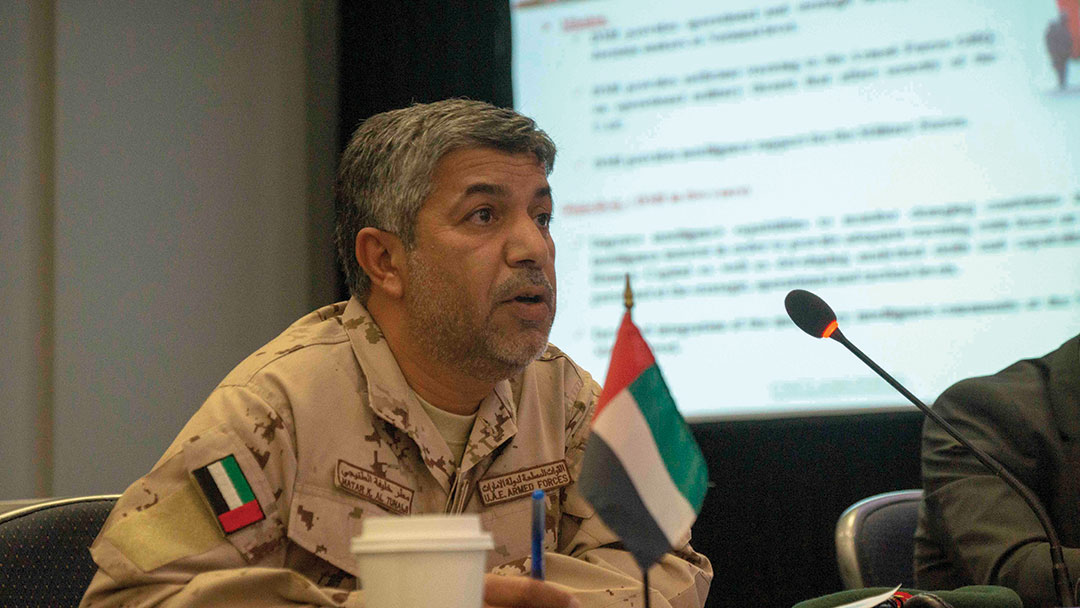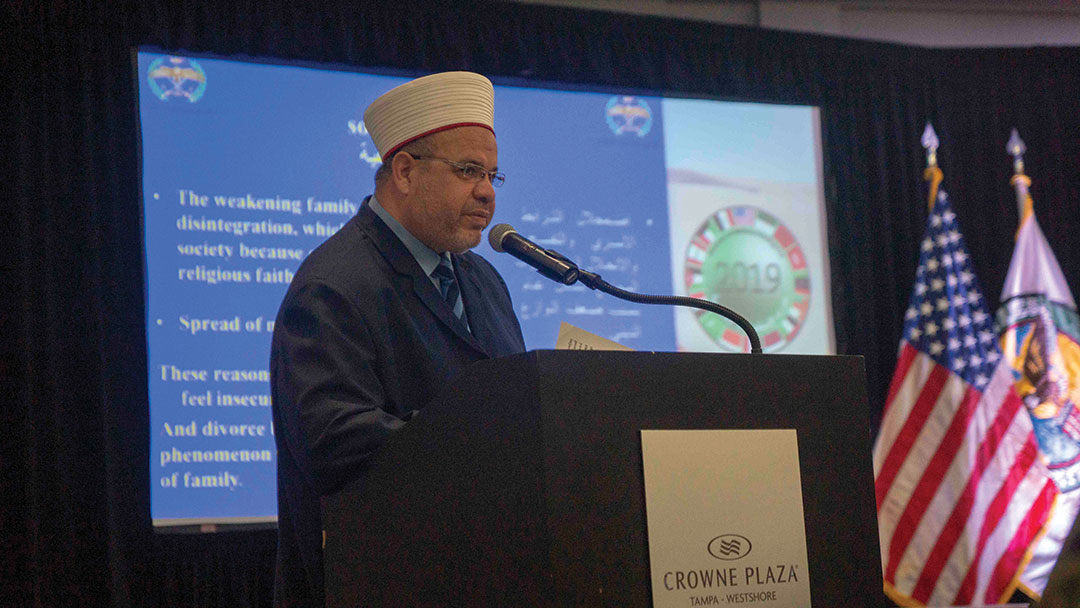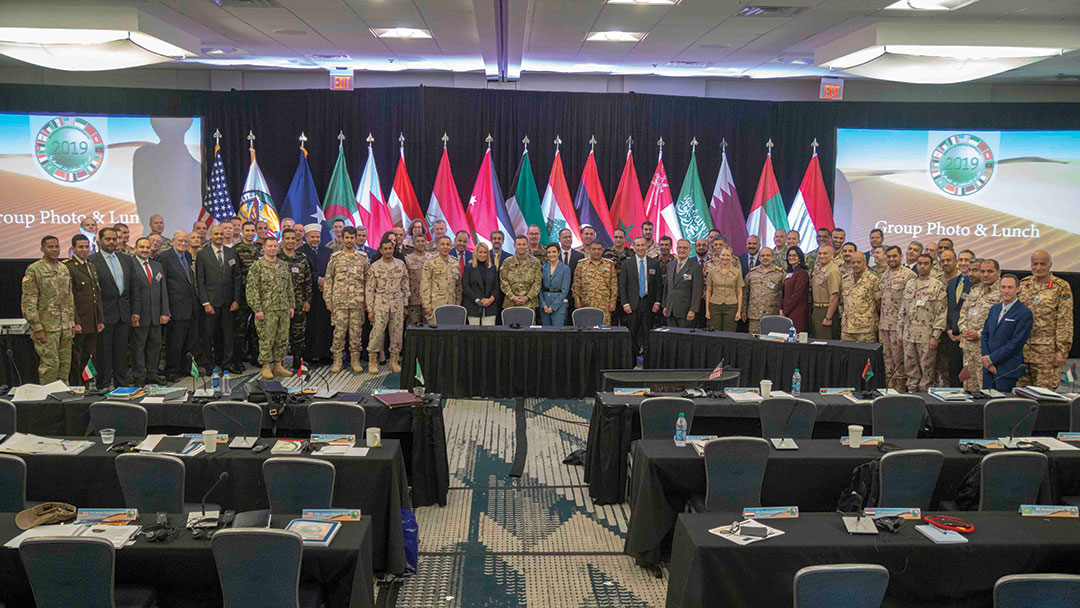Military Intelligence Leaders Focus on Building Relationships and Sharing Knowledge
UNIPATH STAFF | Photos by U.S. CENTRAL COMMAND
Like connecting pieces of a puzzle, military intelligence professionals stress the importance of collecting and sharing information to comprehend the big picture. The goal is to prevent terrorist attacks, anticipate enemy actions and strengthen national security.
Addressing common security challenges, military intelligence leaders from the Middle East and North Africa met from March 31 to April 3, 2019, for U.S. Central Command’s (CENTCOM) inaugural Middle East Directors of Military Intelligence Conference.
Held in the United States in Tampa, Florida, the three-day conference included security experts and military leaders from Algeria, Bahrain, Egypt, Iraq, Jordan, Kuwait, Lebanon, Libya, Morocco, Oman, Qatar, Saudi Arabia, United Arab Emirates, Yemen and the U.S.
The event was a unique opportunity for military intelligence leaders and experts to discuss intelligence modernization and professionalism, intelligence successes and failures, information sharing, training, technology innovation, information operations and working with the media.

“This forum is a very important element to strengthen our relationships and work together,” said Maj. Gen. Ahmed M. Alyafai, chief of the Intelligence and Reconnaissance Authority within the Yemeni Ministry of Defense.
During his presentation, he explained how Iranian malign influence in Yemen has undermined stability and led to destruction. He thanked CENTCOM for hosting the conference and all the countries that participated and shared their experience.
“When I look at the future, I look forward for us continuing to share information and expertise in these areas,” Maj. Gen. Ahmed said.
Officials from the U.S. National Geospatial Intelligence Agency and U.S. Cyber Command spoke about the increasing challenges of storing, tracking and analyzing the virtual flood of data — the result of an increasingly technological world. This also impacts training because intelligence professionals must adapt to new trends and techniques.
Kuwait wants to attract such specialized technicians in the field of intelligence analysis and improve coordination with allied countries by increasing joint training, exercises and conferences, Kuwaiti Armed Forces Director of Military Intelligence Brig. Gen. Fahad Al-Turaiji explained.
“This conference was a fantastic opportunity to focus on developing practical solutions,” Brig. Gen. Fahad said. “I hope the next meeting will focus on the current crises in the Middle East so we can continue sharing our insights.”
Workforce development — recruitment, training and retention — was the focus of officials from the U.S. Army Intelligence Center of Excellence and the National Intelligence University. Having a variety of backgrounds and levels of experience strengthens the organization, but all must share traits such as critical thinking, passion, analytic curiosity, teamwork and professional ethics.
On the issue of ethics, officers highlighted the need for impartiality when collecting and analyzing intelligence.
“The enemy doesn’t play by the same rules. The professionalism of the intelligence community must reinforce the core principles. We must be objective, transparent and provide assessments that are outcome agnostic,” said Capt. Joshua Himes, commander of CENTCOM’s Joint Intelligence Center.

Having a better understanding of the security environment enables intelligence professionals to provide sound analysis and assessments. Brig. Gen. Dr. Majid Darawsheh, grand mufti of the Jordan Armed Forces, gave a detailed presentation of the factors drawing young people to violent extremist organizations, based on a study in Jordan. One common factor is ignorance, or a poor understanding of religion.
“We must fortify these young people with knowledge to share the correct Islamic thought in the Armed Forces,” Dr. Majid said. “We must also develop understanding among Soldiers and fortify affiliation in the Armed Forces whether foot Soldier or officer.”
Intelligence officers should possess ethical traits such as trustworthiness and honesty, Dr. Majid said. Islam permits intelligence collection, provided the information helps a country defend against loss of lives and property.
Qatari Armed Forces Director of Military Intelligence Brig. Gen. Abdullah Mohd Al-Dossari said the conference was the first of its kind for directors of military intelligence from the Gulf countries.
Like many of his counterparts, Brig. Gen. Abdullah shared information related to the complex mission and challenges of providing real-time intelligence and analysis to support military operations and protect national security. He expressed hope that Gulf nations would cooperate to create a regional intelligence fusion center.
Although technology brings new opportunities, it also brings vulnerabilities. Adversaries have access to information they have not had before. For example, commercial imagery of once inaccessible and remote areas is now available to the public on services such as Google Maps.
Innovation and information sharing were among the chief ways discussed to increase effectiveness. Many are trying to focus on building relationships internally among government agencies and with academic, industry and international partners.
Lebanon’s military, for example, sponsors a one-week course so that military intelligence officers can expose the terrorist threat more effectively, said Brig. Gen. Antoine Mansour, director of the Lebanese Army Directorate of Intelligence.
“The more we can do these types of activities together, the more we can all benefit,” Brig. Gen. Antoine said.
CENTCOM Director of Intelligence Brig. Gen. Dimitri Henry expressed his wish that nations routinely organize such conferences to address common problems, improve professional development of intelligence corps and discover practical solutions.
“Thank you for your insight and analysis on the challenges that we collectively face, and more importantly, on those areas where our nations are already working together to solve the complex problems facing each of us in the region,” Brig. Gen. Henry said.
Islam’s View on Intelligence Work
BRIG. GEN. DR. MAJID DARAWSHEH, GRAND MUFTI OF THE JORDAN ARMED FORCES
The concept of intelligence is critical in today’s security environment. Military intelligence professionals must collect information about the enemy in secret and analyze the information in a way that enables leaders and politicians to develop plans to ensure the safety and security of the country.
From an Islamic religious perspective, there is guidance on espionage or impinging on the privacy of a person — looking at and listening to them without their knowledge or examining their writings, documents and secrets without permission. Islam forbids spying on people as long as they do not pose a clear danger. As God says: “O you who believe! Avoid many [negative] assumptions, indeed some assumption is sin. And do not spy on or backbite each other.” [49, 12]

The original ruling on intelligence work is that it is haram (prohibited) in Islam because it goes against the general rules of Islamic law. However, based on the Islamic jurisprudence rules governing intelligence work: “Necessities permit prohibitions,” and “whatever is required to fulfill an obligation is itself an obligation,” provided that espionage is a way to protect the homeland from an expected danger or is a means to avoid these dangers.
In those cases, it is permissible to expose the enemy’s plots and develop appropriate plans that guarantee the security of the homeland and its citizens.
The importance of intelligence is critical because it allows for proper planning and provides early warnings of dangers or surprises from an enemy. This helps save lives and reduce loss of property.
However, intelligence members must be ethical. The following are some of the traits and characteristics that should be promoted not just in intelligence work, but in other military professions as well.
Seeks righteousness and straightness. God says: “The best one you can hire is the strong and trustworthy.” [28, 26]
Avoids the use of violence and compulsion: What is taken with kindness is more important than what is taken by force.
Demands only as much information as needed, but not more.
Protects people’s modesty by keeping some secrets.
Promotes honesty: Doesn’t lie or distort facts.
Hates people’s evil deeds, but not the people themselves.
Pursues justice.

Brig. Gen. Antoine Mansour, the director of military intelligence of the Lebanese Army Directorate of Intelligence branch, offers a one-week course that international intelligence officers may attend to gain a better understanding of the terrorist threats. Brig. Gen. Antoine: “The more we can do these types of activities together, the more we can all benefit.”
This forum is a very important element to strengthen our relationships and work together,” said Yemeni Maj. Gen. Ahmed M. Alyafai, chief of the Intelligence and Reconnaissance Authority, Ministry of Defense. During his presentation, he explained how Iranian malign influence in Yemen has undermined stability and led to destruction. He thanked U.S. Central Command for hosting the conference and all the countries that participated and shared their experience. “When I look at the future, I look forward for us continuing to share information and expertise in these areas.”
Kuwaiti Armed Forces Director of Military Intelligence Brig. Gen. Fahad Al-Turaiji explained that some of his organization’s goals are to attract specialized technicians in the field of intelligence analysis, improve coordination with allied countries by increasing joint trainings, exercises and conferences and other such events related to joint cooperation. “This conference was a fantastic opportunity to focus on developing practical solutions, and I thank the conference organizers,” Brig. Gen. Fahad said. “I hope the next meeting will focus on the current crises in the Middle East so we can continue sharing our insights.”
Qatari Armed Forces Director of Military Intelligence Brig. Gen. Abdullah Mohd Al-Dossari said the conference was the first of its kind for directors of military intelligence from the Gulf countries. “The lectures were very useful,” he said and recommended the conference continue in the future. Like many of his counterparts as a leader in military intelligence, Brig. Gen. Abdullah’s shared information related to the complex mission and challenges of providing real-time intelligence and analysis to support military operations and to protect national security. He also suggested opportunities for the future, such as the potential of a regional intelligence fusion center.

